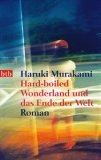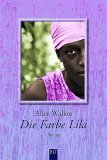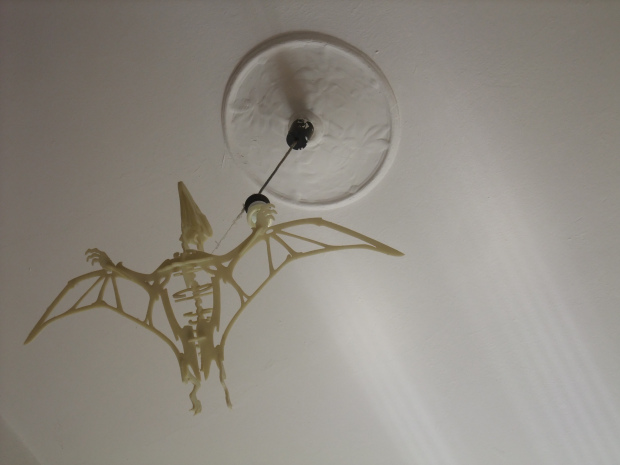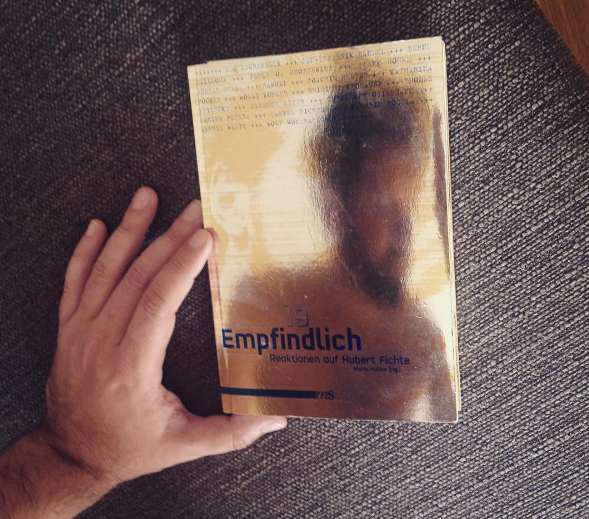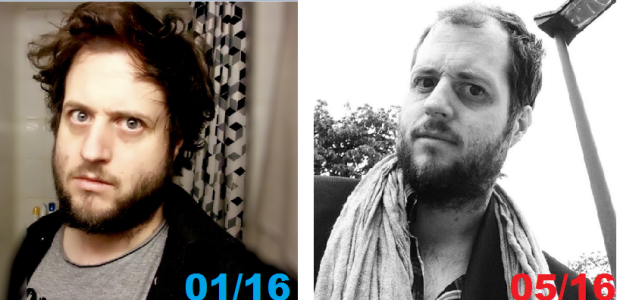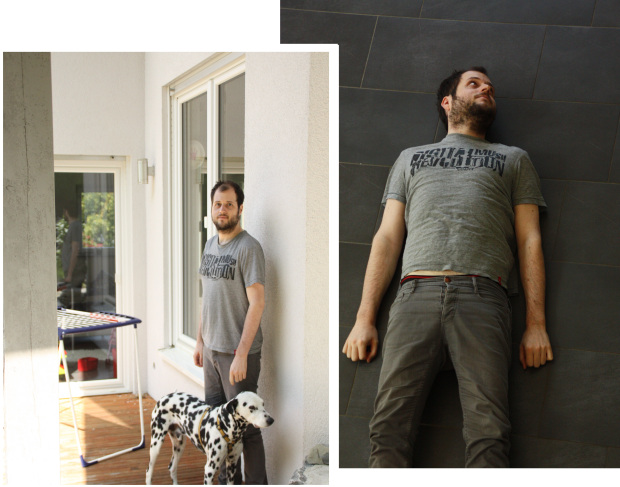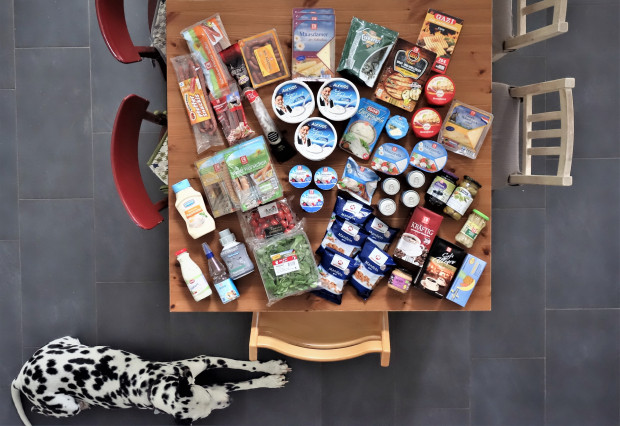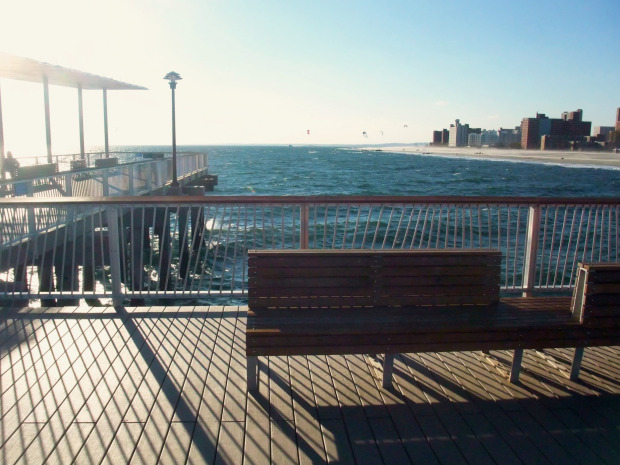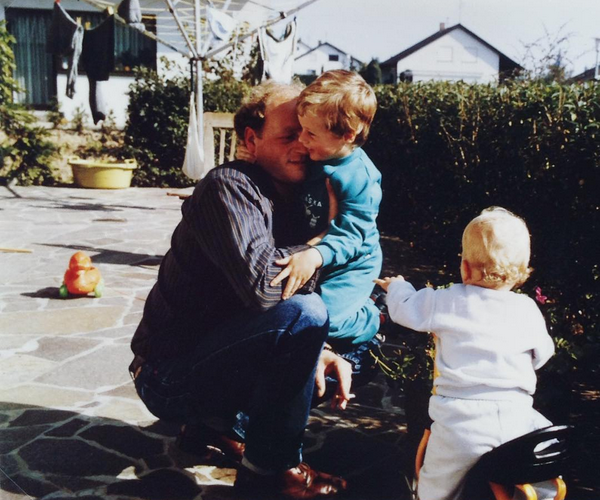
mein Vater, ca. 1987.
.
Wer mich kennt, kennt – überraschend schnell – oft auch meine Mutter: Sie kommentiert auf Facebook, besucht meine Lesungen und folgt den Journalist*innen, Autor*innen und Blogger*innen, die mir wichtig sind. 2008 und 2014 war sie in Hildesheim, beim PROSANOVA-Festival. Und hin und wieder wohnen Studien- oder Literaturfreunde von mir für einige Tage im leerstehenden Haus meiner Großeltern/ihrer Eltern.
Mein Vater hat kein Interesse an Social Media – aber wünschte sich zum 60. Geburtstag persönliche Texte, kurze Anekdoten, Briefe, Erinnerungen für ein privates Buchprojekt.
Ich nahm mir vor, ihm Fragen zu stellen, trug das auf Facebook („Was würdet ihr eure Eltern fragen? Worüber würdet ihr gern mit ihnen sprechen?“)…
…und merkte: Die Frage trifft einen Nerv.
.
Heute, hier im Blog: 200 persönliche Fragen an meinen Vater.
Ich freue mich, dass er mir erlaubt, diese Fragen hier öffentlich zu teilen. Und ich freue mich noch mehr, dass er Lust hat, sie – irgendwann, im privaten Rahmen – auch zu beantworten.
Ein langer Fragenkatalog, ohne Antworten… das wirkt im ersten Moment monoton oder witzlos. Tatsächlich aber liest man zehn, zwölf solcher Fragen – und fängt an, selbst zu überlegen: Weiß ich das, über meine eigenen Eltern? Würde ich diese Frage stellen? Was würde ich selbst antworten?
Falls jemand Ergänzungs-Fragen hat, ähnliche Fragen mit seinen Eltern ausprobiert(e) oder Erfahrungen damit hat, längere persönliche Gespräche in der Familie zu planen, aufzuzeichnen, zu teilen usw.: Lasst hören! Ich freue mich über Feedback.
Stefan
.
:
Lieber Papa: Alles Gute zum 60. Geburtstag!
Mit 17 sah ich in einem Karlsruher Buchladen das Buch „Mr. Hitchcock, wie haben Sie das gemacht?“ von Francois Truffaut: 400 Seiten über ein einziges Gespräch. Truffaut, ein junger französischer Regisseur, hat Hitchcock 1962 besucht und detaillierte Fragen gestellt. Hitchcock gibt Antworten – und erzählt dabei sein ganzes Leben.
Ich habe das Buch damals nicht gekauft – doch die Idee, verschiedenen Menschen sehr viele Fragen zu stellen, lässt mich nicht los.
Statt dir einen Text zu schreiben, habe ich einen Fragenkatalog erstellt. Du musst ihn nicht beantworten. Obwohl ich mich freuen würde, wenn wir uns irgendwann treffen und das versuchen.
Bis dahin machen, glaube ich, auch schon die Fragen für sich allein Spaß:
200 Dinge, über die ich manchmal nachdenke und zu denen ich gern mehr wissen würde.
:
1_Welchen Tag aus deiner Kindheit würdest du gern ein zweites Mal erleben?
2_Was hat dir als Kind am meisten Spaß gemacht?
3_Was ist deine früheste Erinnerung?
4_Nenn mir einen typischen Moment mit deiner Mutter. Und etwas, das du an ihr magst.
5_Was habt ihr gemeinsam?
:
6_Dein Vater war Schmied; später betrieb er eine Tankstelle. Als er starb, warst du noch Grundschüler. An welche Momente mit ihm erinnerst du dich?
7_Waren deine Großeltern wichtig, als Kind? Andere Verwandte? Cousins und Cousinen?
8_Wer sind deine Paten? Hast du einen Lieblingsverwandten?
9_An welchen Punkten im Leben fehlte dir ein Vater?
10_Wie hat sich deine Mutter nach dem Tod ihres Manns verändert? Deine Schwestern?
:
11_Von wem hast du viel gelernt? Hattest du gute Lehrer oder Chefs?
12_Was macht dich an deiner Kindheit glücklich?
13_Mit wem hast du die meiste Zeit verbracht: Klassenkameraden? Nachbarn?
14_Was hast du mit deinen Schwestern unternommen? Habt ihr viel geteilt?
15_Wann warst du zum ersten Mal betrunken? Wen hast du geküsst? Warst du selbstbewusst?
:
16_Wann wurden Autos, Mofas usw. wichtig? Wie hast du dein erstes Auto finanziert?
17_Warst du je gläubig?
18_Wann hattest du als Kind den größten Ärger?
19_Hast du Klassenkameraden, aus denen „etwas wurde“? Freunde, aus denen „gar nichts wurde“? Wer hatte das interessanteste oder überraschendste Leben?
20_Sind Leute, die dich von damals kennen, überrascht, wenn sie dich heute sehen? Wen siehst du, wo? Wen vermisst du?
:
21_Wenn du eine Sache an deiner Erziehung ändern könntest – welche?
22_Du warst kein guter Schüler. Dachtest du trotzdem als Jugendlicher: „Ich bin clever“?
23_Warst/bist du klüger als die Leute aus deiner Jugend, deiner Heimatstadt?
24_Hattest du damals genug Geld? Oder hast du dich arm gefühlt?
25_Wann wurdest du erwachsen: mit welchem Ereignis oder welcher Entscheidung?
:
26_Als Schüler hast du in einem Tante-Emma-Laden gejobbt. Hattest du Spaß? Gab es weitere Neben- und Aushilfsjobs?
27_Hast du beim Bund Freunde gefunden oder Wichtiges gelernt?
28_Hast du danach nochmal mit deiner Mutter unter einem Dach gelebt? War es dir wichtig, auszuziehen? Hast du je allein gelebt?
29_Kanntest du Studenten? Was hältst du von Menschen mit Studium?
30_Was war deine Lieblings-Arbeitsstelle… und was wusstest du über Arbeit, bevor du selbst einen Beruf wählen musstest?
.
31_Was war dir früher wichtig, und ist dir heute ganz egal?
32_Was hast du mit Mama gemeinsam?
33_Was unterscheidet dich von typischen Männern deines Alters?
34_Was unterscheidet dich von typischen Deutschen?
35_Was unterscheidet dich von typischen Vätern?
.
36_Warum wurdest du Mechaniker? Hat der Beruf deine Erwartungen erfüllt?
37_Wie war Mama, als du sie zum ersten Mal getroffen hast? Wann wusstest du: Ich will sie heiraten?
38_Wie hat sie sich seitdem verändert? Was magst du an der Veränderung; was nicht?
39_Wie hat sie dich verändert?
40_Welche Rolle fällt dir am leichtesten: Sohn und Bruder? Vater und Ehemann? Großvater? Wann hast du dich mit deinen Rollen am wohlsten gefühlt?
.
41_Wie war es, mit den Eltern von Mama zu leben?
42_Warum bist du nach Süddeutschland gezogen? Wann war dir klar, dass du bleibst?
43_Mama sagt oft, sie hat dir bei der Jobsuche geholfen. Wie?
44_Du warst bei der Freiwilligen Feuerwehr und in der CDU. Was sind deine Erfahrungen mit den Vereinen und den Menschen im Dorf?
45_Wie war eure Hochzeit? Gab es eine Hochzeitsreise?
.
46_Wofür würdest du gern gelobt oder bewundert werden?
47_In welchem Alter mochtest du dich selbst am meisten?
48_Welchem Menschen bist du am meisten schuldig?
49_Was war deine beste Entscheidung?
50_Wer oder was hat dir das Leben am schwersten gemacht?
.
51_Was macht einen guten Vater aus?
52_Was macht eine gute Mutter aus: etwas anderes als einen guten Vater?
53_Kamen Mama und du aus verschiedenen Schichten, Kreisen? Hättest du gern ihre Kindheit gehabt?
54_Hättest du gern meine Kindheit gehabt?
55_Was wolltest du als Erzieher unbedingt anders machen als deine Mutter?
.
56_Warum arbeiten deine Schwestern so viel und wirken so gequält?
57_Warum hast du ein besseres Verhältnis zu Mamas Bruder als sie selbst?
58_Hatten Mama und du gemeinsame Freunde als junges Paar? Was wurde aus euren Freundschaften?
59_Es gibt Familienmitglieder, mit denen ich dich nie sprechen hörte – Lutz, Ede, Mamas Mutter.
60_Die Kinder deiner Schwester machten früh Ausbildungen, haben geheiratet – und scheinen dich viel toller, witziger zu finden als wir: Hättest du gern bodenständigere Kinder?
.
61_Warum vier Kinder? Warum das erste mit 26? Warum nicht mehr? Weniger?
62_Hattest du noch nie Spaß an Familienaktivitäten, gemeinsamem Abendessen, Gesprächen – oder hast du ihn mit der Zeit verloren?
63_Du hast Söhne und Töchter. Eine gute Mischung, Balance?
64_Mit Kindern in welchem Alter fühlst du dich am wohlsten? (Mein Eindruck: mit vier oder fünf.)
65_Was unternimmst du mit deinen Enkeln? Was magst du an ihnen?
.
66_Inwiefern waren Mama und du „Eltern der 80er, 90er“: Wie hat euch der Zeitgeist, das Familien- und Elternbild beeinflusst?
67_Was würdest du heute anders machen?
68_Ich habe selten das Gefühl, du seist von uns Kindern enttäuscht – doch denke dauernd, dass wir dich langweilen: unsere Geschichten sind uninteressant, unsere Probleme vermeidbar.
69_In welchem Alter fandest du mich am sympathischsten? Am unsympathischsten?
70_Und Mama? Und meinen Bruder? Dich selbst?
.
71_Gibt es jemanden, den du stolz machen willst oder dessen Lob dir wichtig ist?
72_Ist Kochen und Putzen Frauenarbeit?
73_Hast viel gearbeitet, weil eine Familie Geld braucht… oder, weil du den Beruf spannender findest als ein Familienleben?
74_Jeden Abend hast du an der Dorftankstelle ein Feierabendbier getrunken. Wann hörte das auf? Warum? Was gaben dir diese Männer/Gespräche – und habt ihr heute noch Kontakt?
75_Als Kind hatte ich den Eindruck, deftiges Mittags- und Sonntagsessen wären für euch unverzichtbar. Heute isst Mama ganz andere Gerichte, zu anderen Zeiten. Du selbst auch. Mein Bruder scheint der einzige zu sein, der solche Mahlzeiten mag. Warum die ganze Mühe mit Hausmannskost, damals?
.
76_Was dachtest du in meiner Kindheit, was aus mir wird?
77_Was dachtest du als Kind, was aus dir selbst wird?
78_Was nervt oder ängstigt dich an Familien an meisten?
79_Haben wir Geschwister mehr Unterschiede oder mehr Gemeinsamkeiten? Musst du auf vier sehr verschiedene Arten Vater sein?
80_Was hat dich am Vatersein überrascht? Worauf warst du nicht vorbereitet oder eingestellt?
.
81_Wer ist dir ebenbürtig und kann dich gut verstehen?
82_Was ist dir peinlich? Vor wem?
83_Was war das Mutigste, das du je getan hast?
84_Was war das Feigste, das du je getan hast?
85_Viele Freunde von mir fühlten von ihren Eltern als Kind unter Druck gesetzt und hörten immer wieder: „Was sollen nur die Verwandten denken?“ Mama und dir schienen die Verwandten, Nachbarn usw. recht egal.
.
86_Fiat ist ein italienischer Konzern. Wie zeigte sich das bei deiner Arbeit?
87_Wenn Fiat-Händler ein Problem nicht diagnostizieren oder beheben konnten, wurden die Autos in deine Abteilung geschickt, oder? Was war das interessanteste Problem, die überraschendste Diagnose?
88_Was hast du im Auto auf dem Weg zur Arbeit gemacht: Musik gehört? Nachgedacht? Hast du heute noch ähnliche ruhige, passive Momente im Alltag?
89_Du warst etwa 15 Jahre bei Fiat: Ab wann wolltest du dich selbstständig machen? Dachtest du als Berufsanfänger, du bleibst dein ganzes Leben im selben Konzern?
90_Was machten die Monate in Turin und das Italienischlernen aus dir? Mama sagt oft, sie wurde selbstbewusster, mutiger. Hast du Turin als ähnlichen Kulturschock und ähnliche Befreiung erlebt?
.
91_Worauf hast du verzichtet – und später gedacht: Es war ein Fehler, darauf zu verzichten?
92_Warum mögen dich Leute? Was gefällt ihnen an dir?
93_Was magst du selbst an dir?
94_Schon immer – oder musstest du erst lernen, dich zu mögen und an deinen Stärken/Schwächen zu arbeiten?
95_Was war dein bestes, schönstes Jahr?
.
96_Du sprichst gern mit Kellnern, Verkäuferinnen, machst Witze mit Polizisten und Briefträgern. Hast du mehr Spaß mit Fremden als mit Freunden?
97_Warum ist D. dein bester Freund? Wie überlebte diese Freundschaft so lange?
98_Du spielst gern Streiche. Dein bester Streich, deine beste Lüge?
99_Oft weichst du Fragen aus: Du magst du es, Menschen zu überrumpeln oder sie zu dominieren, indem du Fakten vorenthältst. Und du erzählst nur, wenn es unbedingt nötig ist oder jemand explizit nach etwas ganz Konkretem fragt: Woher die Lust, Dinge möglichst lange für dich zu behalten?
100_Du stellst kaum eigene Fragen und weißt nicht viel über das Innenleben deiner Familie. Warum?
.
101_Mama spricht oft nostalgisch über „die Ursprungsfamilie“. Verstehst du das? Ist alles, was ab ca. 40 kam, für euch ein Nachklapp?
102_Hattest du gute Karten? Bist du privilegiert?
103_Welchen Menschen schuldest du etwas? Was?
104_Schuldest du dem Staat etwas? War Deutschland gut zu dir?
105_Haben dich Leute in Schubladen gesteckt… wegen deines Geschlechts, deines Gewichts, deiner Kleidung, Bildung etc.?
.
106_Wärst du gern etwas früher oder später geboren? Bei Mama denke ich oft, dass sie 20 Jahre älter oder jünger weniger aus dem Rahmen fallen würde.
107_Gibt es einen Politiker, den du gern gewählt hast und von dem du viel hältst?
108_Hast du als Kind oder Teenager jemanden bewundert?
109_Fandest du dich mal hübsch? War dir dein Aussehen wichtig; war es wichtig, was du anhast?
110_Bist du „normal“? Bist du Teil der Mehrheit?
.
111_Warst du ein „armes“ Kind? Bist du ein „reicher“ Mann? Hast du die soziale Schicht gewechselt, im Lauf deines Lebens?
112_Wo zeigt es sich, dass deine Mutter ärmer ist als du, dass deine Kinder gebildeter sind usw.?
113_Sprichst du am liebsten mit Männern in deinem Alter, aus deiner Schicht? Oder mit Jüngeren, die weniger Macht und Wissen haben?
114_Ist es einfacher für dich, mit deinen Angstellten zu sprechen als mit deiner Familie?
115_Du furzt oft und findest es lustig, wenn sich Menschen fürs Furzen, Rülpsen usw. schämen oder genieren. Hast du schon einmal gefurzt… und es kam fürchterlich an?
.
116_Drei Dinge, die dich unzufrieden machen?
117_Drei Dinge, die dich zufrieden machen?
118_Die beste Erfindung, Neuerung, Verbesserung im Lauf deines Lebens?
119_Du liebst Geschäftstelefonate – doch das Internet macht dich wütend, vor allem Social Media. Warum?
120_Eine Theorie zu Fortschritt und Alltag: Technik, die man schon als Kind kannte, hält man für selbstverständlich. Technik, die während der Jugend erfunden wird, nutzt man oft aufgeschlossen. Doch bei Technik, die ab dem ca. 30. Lebensjahr massentauglich wird, ruft man: „Wozu soll das gut sein? Das braucht doch keiner!“ Welche Innovationen seit… 1986 machen dich sehr glücklich?
.
121_Hattest du Tiere als Kind? Wolltest du welche?
122_Mit ca. 30 hast du viel Zeit mit einer Modelleisenbahn verbracht. Gibt es Dinge, die du als Kind entbehren musstest und als Erwachsener nachholst?
123_Hatte mein Bruder als Kind die Möglichkeiten, die du gern selbst gehabt hättest, als Kind? Hat der Sohn meines Bruders heute als Kind die Möglichkeiten, die mein Bruder gern selbst gehabt hätte, als Kind?
124_Wann haben Menschen an dich geglaubt: Mentoren, Förderer, Experten, deren Meinung dir etwas bedeutet? Gab es väterliche Figuren in deinem Leben?
125_Ist dir beruflich je ein großer Patzer, Fehler unterlaufen? Hast du immer alles richtig gemacht?
.
126_Hattest du je Affären mit Frauen in Italien?
127_Welche Gemeinsamkeiten hast du mit dem erstem Mann deiner heutigen Frau?
128_Was bedeuten dir die beiden Kinder der Frau, mit der du von 1998 bis 2004 (?) zusammengelebt hast, R. und C.? Habt ihr Kontakt?
129_Du hast mehrere Häuser/Gebäude entworfen und gebaut. Woher nahmst du die Selbstsicherheit und Kompetenz?
130_Du baust Häuser für die Ewigkeit – doch hattest in den letzten 20 Jahren vier verschiedene Adressen. Warum kann man in deinen Grundrissen so schlecht Möbel neu umstellen? Und: Hast du je ein Zimmer, Möbelstück etc. zurückgelassen, das dir noch heute fehlt?
.
131_Wie oft warst du verliebt?
132_Was ist der Unterschied zwischen Angestellten und Kindern?
133_Warum freut es dich, wenn deine Kinder, deine Schwiegertochter usw. zu deinen Angestellten werden?
134_Deine Frau arbeitet in deiner Firma – und abends, sagt sie, unterhaltet ihr euch stundenlang über den Tag. In meiner Kindheit bist du Gesprächen oft aus dem Weg gegangen. Was ist heute anders?
135_Früher schienen dir Hunde egal. Dann holte C. einen Hund. Du wolltest nie eine Katze – jetzt hast du zwei, mit deiner Frau. Was sind deine größten Sinneswandel… und überraschen sie dich selbst?
.
136_Du sagst, du hast noch nie einen Roman komplett gelesen. Hast du als Kind schlechte Erfahrungen mit Büchern gemacht?
137_Hast du je interessante Bücher (Bildbände? Sachbücher?) bekommen oder selbst verschenkt?
138_Welche Filme kennst du: 1989 waren wir, glaube ich, als Familie in Disneys „Oliver & Co.“ Warst du seitdem im Kino?
139_Gibt es eine erfundene Geschichte, die du spannend; eine Figur, die du sympathisch findest?
140_In der dritten oder vierten Klasse waren wir beide abends mal allein: Ich schrieb am nächsten Tag eine Heimat-und-Sachkunde-Arbeit. Trotzdem sahen wir zusammen „Indiana Jones und der letzte Kreuzzug“, im Fernsehen. Mir blieb das – auch deshab – in Erinnerung, weil der Film von Vätern und Söhnen handelt: Kannst du dich erinnern… an diesen Film oder an etwas anderes, das ich als Kind mit dir zusammen sah?
.
141_Manchmal bekommst du Konzertkarten für Bands deiner Jugend geschenkt (Pink Floyd?). Erzähl von den Konzerten: Hast du Spaß?
142_Du lässt so wenig Kultur in dein Leben, hältst so vieles für Schrott… warum hörst du (schrottiges) Radio, abends?
143_Ich weiß kaum etwas über die Stones, die Beatles, Bands der 60er und 70er – weil es bei uns kaum Platten und CDs gab. War Mama und dir Musik egaler als euren Altersgenossen? Schon immer – oder erst, als ihr Kinder hattet?
144_Sind die USA das Land, das du am meisten hasst? Jede US-Serie, jedes US-Videospiel, jede Amerikanisierung in den 80ern schien dich wütend zu machen: Liegt das am zweiten Weltkrieg und der Besatzung?
145_Ist Deutschland das Land, das am besten zu dir passt? Wolltest du je woanders leben?
.
146_Was willst du abschaffen? Wen willst du an die Wand stellen?
147_Du gibst Leuten oft die Schuld, dass sie Geld verschwenden, etwas kaputt machen oder verlieren. Was sind die größten Schäden oder Fehler, die dir selbst unterliefen?
148_Haben Menschen, die nicht arbeiten, Respekt verdient?
149_Haben Menschen einen guten Kern – oder sind sie eher schlecht?
150_Findest du die meisten Menschen dumm, aufgeblasen, lächerlich?
.
151_Nenn mir drei Frauen, die besser, klüger, stärker sind als du.
152_Über welche Themen streitest du dich?
153_Hast du dich je geprügelt? Gibt es Leute, vor denen du kuschen musst oder die nicht wissen, dass du nichts von ihnen hältst? Hast du Gegner, Rivalen, geschäftliche Konkurrenten?
154_Wann hast du zuletzt jemanden beschimpft, blamiert, zurechtgewiesen oder ihm vor Augen geführt, dass du besser bist?
155_Was magst du an dir selbst am wenigsten? Was ist deine schlechteste Eigenschaft?
.
156_Gibt es jemanden, auf den du eifersüchtig warst oder den du beneidest?
157_Wurdest du als Kind geschlagen oder verletzt?
158_Was würdest du tun, falls du beobachtest, dass ich mein Kind schlage?
159_Habe ich dich mal verletzt?
160_Wer soll zuerst sterben: deine Frau oder du?
.
161_Wie lange willst du leben? Hast du Angst vor dem Älterwerden? Fühlst du dich alt?
162_Moderne Sechzigjährige sind viel aktiver und lebendiger als die Opas, die ich aus meiner Kindheit kenne: Wann und wo bist du älteren Menschen begegnet, die dir Lust aufs Alter machen?
163_Wird alles schlechter? Geht alles den Bach runter?
164_In welchem Jahr passte das allgemeine Zeitgefühl, die Stimmung usw. am besten zu dir selbst: In welchem Jahr hast du dich in der Gegenwart am meisten daheim gefühlt?
165_In meiner Kindheit hattest du oft Magenschmerzen und Angstgefühle: „Luft im Bauch“. Wann hörte das auf?
.
166_Woran merkst du, dass du nicht aus Süddeutschland kommst? Woran merkst du, dass du aus Niedersachsen kommst?
167_Hast du je gedacht, du würdet in deinem Heimatstädtchen alt werden?
168_Du kennst Ostdeutschland recht gut, Österreich, viele deutsche Rennstrecken und Kartbahnen: In welcher Region fühlst du dich am wohlsten – und welche Unterschiede fallen dir auf?
169_Wer war dein Nachfolger bei Fiat? Habt ihr Kontakt? Wärst du vor 20 Jahren dort geblieben – wer wärst du heute?
170_Hattest du je andere Berufswünsche?
.
171_Welche Rolle spielst du heute, am Telefon deiner Firma: Verkäufer? Berater, Experte? Taktiker? Magst du diese Rollen?
172_Ist es noch wichtig, dass deine Firma mit Autos, Motorsport zu tun hat – oder musst du so viel organisieren, dass du genausogut Regenrinnen oder Sicherheitsglas verkaufen könntest?
173_Du sagst oft, Motorsport sei Luxus: Findest du, dass deine Kunden ihr Hobby (und sich selbst) zu wichtig nehmen?
174_Wenn du auf Rennstrecken arbeitest: Fieberst du noch mit? Welche Fahrer, Sportler, Teams bewunderst du?
175_Autodesign ist dir nicht wichtig, oder? In den 50ern, 60ern waren Autos ein Faszinosum. Hat dich das je interessiert – und stört es dich, dass Sportwagen, Automarken, das „richtige“ Auto usw. heute keine große Rolle mehr spielen?
.
176_Du bist oft umgezogen. Gibt es Gegenstände, Kleidung, Schmuck etc., die du vermisst?
177_Gibt es Geschenke, die dir viel bedeuten? Gibt es Lob, das dir viel bedeutet?
178_Lobst du Leute genug: deien Frau? Mama? Meine Geschwister?
179_Du magst Ordnung, Archive, Lagerschränke. Was wirfst du weg?
180_Hast du Persönliches aufgeschrieben? Hast du alles gesagt, was du sagen wolltest?
.
182_War während der vielen Familienfeiern in den 80ern nicht veilleicht eh schon absehbar, dass es zu wenige Überschneidungen zu diesen Verwandten gibt: Wozu all diese Treffen? Heute gibt es kaum noch Kontakt.
183_Bei dir, bei Mama und bei meinem Bruder denke ich oft, ihr habt genaue Vorstellungen, was eine Familie ausmacht, braucht… auch, wenn ihr viele dieser Rituale, Ausflüge, Regeln usw. persönlich gar nicht mögt. Woher kommen diese Ideen, was sich für eine Familie gehört?
183_Was war dein schönster oder wichtigster Geburtstag?
184_Was ist das Beste, das du anderen Leuten geschenkt oder ermöglicht hast?
185_Du gewöhnst dir das Rauchen ab. Sagst, es war keine große Anstrengung… und fängst doch wieder an. Du trinkst nichts… und dann doch wieder. Warum diese Rückfälle?
.
186_Sind die Frauen in den richtigen Lebensphasen bei dir? Hättest du mit Mama, C., und deiner heutigen Frau auch in anderen Reihenfolgen, anderen Lebensphasen glücklich werden können?
187_Was hast du aus deiner ersten Ehe für die zweite gelernt?
188_Was genießt du an deinem Leben gerade am meisten: dass du dein eigener Chef bist? Dass du Erfolg hast? Dass du kaum noch familiäre Pflichten hast? Dass du am Wochenende auf Rennstrecken bist?
189_Hast du Geld in den Sand gesetzt oder unnötig ausgegeben – oder haben sich alle Investitionen immer gelohnt?
190_Wenn ich anderen von dir erzähle, merke ich oft: In einer Serie wärst du die Lieblingsfigur vieler Zuschauer. Du hast die besten Sprüche. Nimmst die Aufregung anderer Leute nie besonders ernst – aber sorgst selbst für Aufregung. Würdest du gern Zeit mit einem Menschen wie dir verbringen?
.
191_Hast du deiner Mutter alles gesagt, was du ihr sagen wolltest?
192_Hast du deine Schwester je in Australien besucht?
193_Gibt es etwas, das du schon lange tun wolltest? Warum hast du es noch nicht getan?
194_Gibt es etwas, das du nicht kannst – aber noch lernen willst?
195_Was hast du erst sehr spät gelernt, ausprobiert, erlebt, verstanden?
.
196_Was hättest du gern früher gewusst?
197_Bist du deiner Familie dankbar… oder sollte deine Familie dir dankbar sein? Gibst oder nimmst du mehr?
198_Liest du diese Fragen gern? Hättest du Lust, sie zu beantworten – oder bist du froh, dass du nicht antworten musst?
199_Was ist die größte Gemeinsamkeit zwischen uns beiden?
200_Was wäre der größte Gefallen, den ich dir gerade tun könnte?
.
weitere Fragebögen, Gespräche und Interviews von mir, u.a.:
100 Fragen an Stephan Porombka
Cory Doctorow | Jagoda Marinic | Anne Köhler | Ayelet Waldman | Sandra Gugic | Monika Maron | Barbara Honigmann | Brewster Kahle | Sally Pascale | Hans Hütt
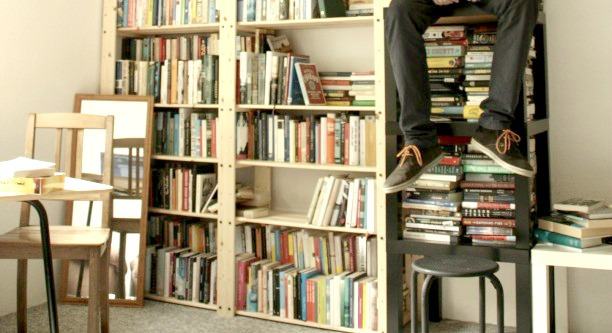

















![暗殺教室 1 [Ansatsu Kyoushitsu 1] (Assassination Classroom, #1)](https://iza-server.uibk.ac.at/pywb/dilimag/20210113092156im_/https://images.gr-assets.com/books/1361686014m/15778848.jpg)























